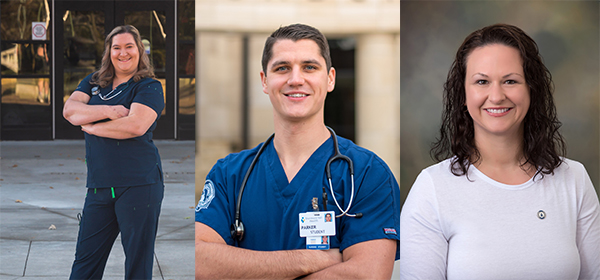Intensive Care
Recent nursing graduates provide compassionate care during pandemic

(Audrey Hastings, bsn '19, Parker Jones, bsn '19, and Courtney Wallis, bsn '18)
From The Ichabod - Winter 2021
Last March, Audrey Hastings, bsn ’19, was excited to start her nursing career in the medical intensive care unit at Stormont Vail Health in Topeka. Then the COVID-19 pandemic hit, and the job Hastings had trained for changed drastically almost overnight. To prepare for a potential surge of critically ill patients, the hospital’s MICU combined with the surgical intensive care unit, growing from 12 beds to 60. The unit also recruited additional staff and stocked up on personal protective equipment. Then they waited – though nobody was entirely sure what to expect.
“At first, it was kind of like waiting for the bomb to drop,” Hastings said. “We were watching other states like New York and Georgia get hit really hard. We had done all these preparations, so waiting was almost harder than anything. Once we started to get more knowledge, the fear started to leave. We started to get more confident in how we would treat people, and that made everybody feel a lot better.”
Treating patients with coronavirus has become a part of daily life for Stormont Vail’s staff, but some aspects of the job never get easier, especially because once patients arrive in the ICU, they are typically in for a long stay and many of them don’t make it out at all.
“A lot of times once they end up with us, they’ll stay for weeks to months,” Hastings said. “Their families will show us pictures of them and they don’t even look the same. Recoveries are few and far between – a lot of times once they make it to ICU, it’s a very hard-fought road. Not allowing families in or holding a family member up on Zoom to say goodbye – that’s been really hard.”
Former ICU nurse Courtney Wallis, bsn ’18, found working in the hospital environment too emotionally overwhelming once COVID-19 arrived. While she began the pandemic caring for critically ill patients – only a handful with coronavirus – she soon felt the immense toll her vocation was having on her health and well-being.
“People were still dying of all the normal stuff – that hadn’t changed just because COVID came around,” Wallis said. “But family members couldn’t come in to be with their dying relatives, and it was just so hard. Relatives were distraught and angry at the same time. It was heartbreaking. The emotional stuff got to me more than anything – it wasn’t even COVID as much as the environment it caused.”
Now Wallis works at a Topeka-area correctional facility, where she has seen another side of the virus in the young, asymptomatic inmates who can’t comprehend why they are required to stay alone in their cell for days on end after testing positive.
“They don’t understand why they need to quarantine because they feel fine,” Wallis said. “They say they don’t understand what the big deal is, and I say that if they’d ever seen it from the other perspective, they’d totally understand what the big deal is. You never know who is going to react in what way. It’s so strange – one person will be intubated for 45 days, and somebody else will be working out.”
In addition to facilitating communication between patients and relatives, for Parker Jones, bsn ’19, an emergency room nurse at the University of Kansas Health System St. Francis Campus in Topeka, convincing patients to get regular health care amid the pandemic has also been a challenge – as has wearing PPE that includes gowns, gloves, an N95 surgical mask, goggles and a face shield. Wallis and Hastings said wearing multiple layers of PPE proved difficult as well, often making them feel overheated and claustrophobic. But they have all developed the ability to stay calm under pressure – a professional skill Jones said he learned during his time at Washburn University.
“At Washburn, all of our clinical instructors maintained a positive attitude despite stress,” he said. “It was awesome to see that – it helped me realize with all of the stress I go through at work, I need to maintain a positive attitude. There was still a lot to learn, but I felt like it was easier because of what Washburn provided me as a base.”
All three nurses agreed on the importance of taking precautions against COVID-19, underscoring that doing a few basic things as a society – wearing a mask, practicing social distancing and washing hands regularly – can help everyone get back to normal.
“If we just do these simple things, we can all help each other,” Hastings said. “If people could see the patients we work so hard for months to try and save – if they could see the look on those nurses’ faces or those families’ faces – I feel like they would see it differently.”